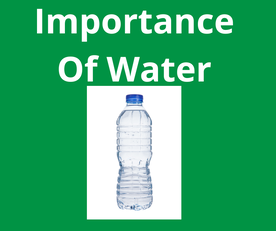|
24/9/2023 0 Comments Why Is Water So Important to Drink, and How Much Should I Drink on a Daily Basis?Water is essential for the proper functioning of our bodies and plays a crucial role in maintaining overall health and well-being. In this blog, we'll delve into the importance of drinking water and provide guidance on how much you should consume daily to stay adequately hydrated. The Importance of Water: 1. Cellular Function: Water is a fundamental component of every cell in your body. It's involved in various cellular processes, including nutrient transport, temperature regulation, and waste removal. Without sufficient water, these processes can become less efficient, affecting your overall health. 2. Body Temperature Regulation: Sweating is your body's natural cooling mechanism. When you're hot or active, you sweat to regulate your temperature. Sweat is primarily composed of water, so staying hydrated is essential to avoid overheating, especially during exercise or in hot weather. 3. Digestion and Nutrient Absorption: Water plays a vital role in digestion. It helps break down food in your stomach and intestines, facilitating the absorption of nutrients. Insufficient water intake can lead to digestive issues like constipation. 4. Joint Lubrication: Joints require adequate hydration to stay lubricated. Dehydration can lead to joint discomfort and potentially exacerbate conditions like arthritis. 5. Toxin Removal: Your body relies on water to flush out waste products and toxins through urine, sweat, and bowel movements. Proper hydration supports the efficient removal of these harmful substances. How Much Water Should You Drink Daily? The amount of water you need can vary depending on factors such as age, sex, activity level, climate, and overall health. However, a general guideline is the "8x8" rule, which recommends drinking eight 8-ounce glasses of water a day, totaling about 2 liters or half a gallon. This is a simple way to remember your daily water intake, but it's not a one-size-fits-all solution. A more personalized approach takes into account your individual needs: 1. Activity Level: If you're physically active or live in a hot climate, you'll need more water to compensate for the fluids lost through sweating. 2. Body Size: Larger individuals generally require more water than smaller ones. 3. Health Conditions: Certain medical conditions, like kidney stones or urinary tract infections, may require increased water intake as advised by your healthcare provider. 4. Pregnancy and Breastfeeding: Pregnant and breastfeeding individuals need extra fluids to support their body's increased demands. 5. Thirst: Listen to your body. Thirst is a reliable indicator of when you need to drink more water. 6. Diet: Foods like fruits and vegetables also contribute to your daily hydration needs. If you consume a diet rich in these foods, you may require slightly less water. Conclusion: Water is indeed the essence of life, and its importance cannot be overstated. Staying adequately hydrated is essential for your body to function optimally. While the "8x8" rule is a helpful guideline, it's crucial to pay attention to your body's signals and adapt your water intake to your unique circumstances. Remember that individual hydration needs can vary, so staying attuned to your body and maintaining a consistent water intake can help you achieve and maintain good health. #personaltraining #personaltrainer #weights #weighttraining #strength #gym #fitness #fitnessjourney #fitnessmotivation #cardio #weightloss #coach #maynooth #kilcock #clane #celbridge #leixlip
0 Comments
Your comment will be posted after it is approved.
Leave a Reply. |
Search by typing & pressing enter


